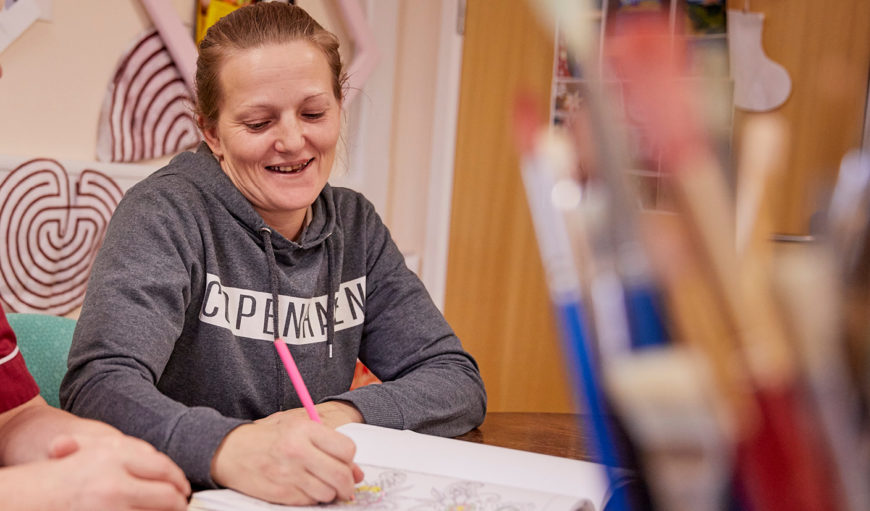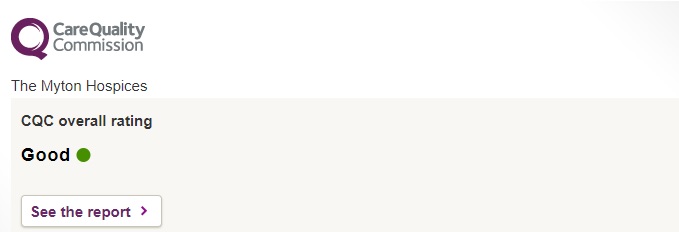We’re shining a spotlight on some of the services The Myton Hospices provides and finding out a bit more about the people involved with them.
Gwen Lowe has been working with patients, both in our Day Hospices and Inpatient Units, at Myton for 12 years. She told us a bit more about herself and the role she plays within Myton.
Can you describe yourself in three words?
Creative, I can be a bit ditzy sometimes, and sensitive. (And perceptive, but that’s four words!)
If you could travel anywhere in the world, where would you go and why?
I would like to travel to the Okinawa Island, which is just off Japan, because I’m fascinated by the way they live. They have a longer life expectancy due to their way of living and stress free lives. They remain close to their families, lead an outdoor life and are able to work on the land until they are in their nineties plus. Their diet also plays a large part, eating a lot of plant based foods, fish and very little meat.
Who do you admire most in life?
I admire my son for everything he has achieved and the person he has grown up to be; I’m very proud of him. He gives a lot back to the community – he’s started up a football team on Sunday mornings and he helps a lot with his local Cubs group. My daughter volunteers at the local school when she can, as well as bringing up a young family – I’m proud of them both.
If you won the lottery, how would you spend it?
I really don’t know as there’s not a lot I actually want. I’d give some to family, give some to charity and I’d put quite a bit of it away. I wouldn’t move, I’d maybe change my car, maybe buy a place in Cornwall as a retreat. I do need a new studio at the bottom of the garden too! You don’t know really know what you would do with that amount of money until you’re faced with it, but I think I would make sure that I have enough to be comfortable enough to see my time out.
What is a skill you’d like to learn and why?
I would like to learn how to do calligraphy, and probably do a horticultural course of some sort. I’d like to improve the skills I think I already have too.
Why did you decide to come to Myton?
I had just finished my degree at Coventry University and I wanted do Art Therapy, I’d worked on the district nursing service, and you needed 12 months working in the community plus your art degree to get started. I saw the job at Myton advertised so went for it. I’ve been at Myton for 12 years now!
What does your role entail?
I cover all three Myton sites and I am very much patient led according to where I’m needed. The work involved can be an opportunity for someone to learn a new skill, or it can be an opportunity for a patient to while away the hours if they want to. We’re finding now that there is a focus on patients wanting to leave a legacy for their family – they don’t want to feel like they will be forgotten. Memory books are becoming popular; they pick a moment in their life to focus on to create the book. Providing we’ve got the equipment, we can turn our hands to pretty much anything. Myself and the volunteers have quite a broad knowledge between us.
How would you describe Myton in three words?
I can’t think of three words, but it’s very much like when you put your dressing-gown and slippers on. It is comfy, like home.
What do you enjoy most about your role?
I must admit it is the end of life work. Although it can be upsetting and can test you as a person emotionally, I really like it because you really feel you’ve done something worthwhile and really immersed yourself in that person’s life. It tests you creatively because you want the work to be by and from them, but they are at a stage where, due to the treatment they are undergoing, it can make things more challenging for them. I feel it’s important for the patient to have put as much of themselves into the piece of work that they are producing as they can.
What do you find most challenging about your role? How do you deal with it?
The emotional side, particularly when you do hand casts with a patient and their loved one, and family hand casts. I think finding a solution to people’s limitations is difficult. People’s limitations have usually changed when they come to us and part of my role is finding another way for patients to do what it is that they want to achieve. Some people may have done art all of their lives and been quite proficient at it, but then they may wish to leave it behind at this time due to their illness and you have to respect that. For others, it’s an opportunity to have this time to themselves and pick up on new or existing hobbies. We have to find a way for them to continue but maybe trying out different materials or mediums that may or may not have considered in the past.
What has been your most memorable moment at Myton so far?
Last year we were able to put a poster in for the national conference of Help the Hospices. We put our hand casts project forward for it. What was so lovely was that Irene, one of the patients at Rugby, had very definite ideas about how she wanted it to look. Craig, Myton’s graphic designer, was heavily involved in creating the poster along with Irene, her husband Robin and myself. They saw it as their way of helping Myton. Irene passed away before the conference dates but Craig was able to get the poster finished in time for Irene to see the finished project. She and Robin also wrote a poem to support the main piece.
I’m really proud of the poster that we created between us and that we were able to all work together to capture Irene and Robin’s story of the courage, support and dedication they shared through the difficult times.
What is the Hands Project?
Patients who come to us for a hand cast all have huge strength of spirit and character. They come to us at the most testing time of their lives and to be able to do a hand cast with a loved one can be a beautiful yet powerful lasting memory.
The mould is made from alginate powder which is a seaweed base and very safe to use. When the mould has been made, plaster of paris is then poured into it creating an exact replica of the hands. Rings may be worn as they help to characterize the finished cast.
The process is not just about making an impression of their hand, it is symbolic of who they are, as the hand can be the most tactile and intimate part of the body.
How do you think art as therapy helps people at Myton?
You do not need to be an artist, nor do you need to feel that you are any good at art to benefit from exploring creativity. It is not necessarily about how a finished piece looks, it can also be used as a tool to help engage in our feelings and have a better understanding of ourselves. Art can lift spirits and have a calming influence, whether you are taking part, learning a new skill or just appreciating the work around you.
“Variety of form and brilliancy of colour in objects presented to patients are an actual means of recovery” – Florence Nightingale, 1888.
What would you say to someone who was unsure about coming to Day Hospice?
I’d say spend some time with us, you can come for an informal visit, have a look around and see if it is for you. You’d be pleasantly surprised.
If you would like to find out more about the services that we have to offer, please click here.





